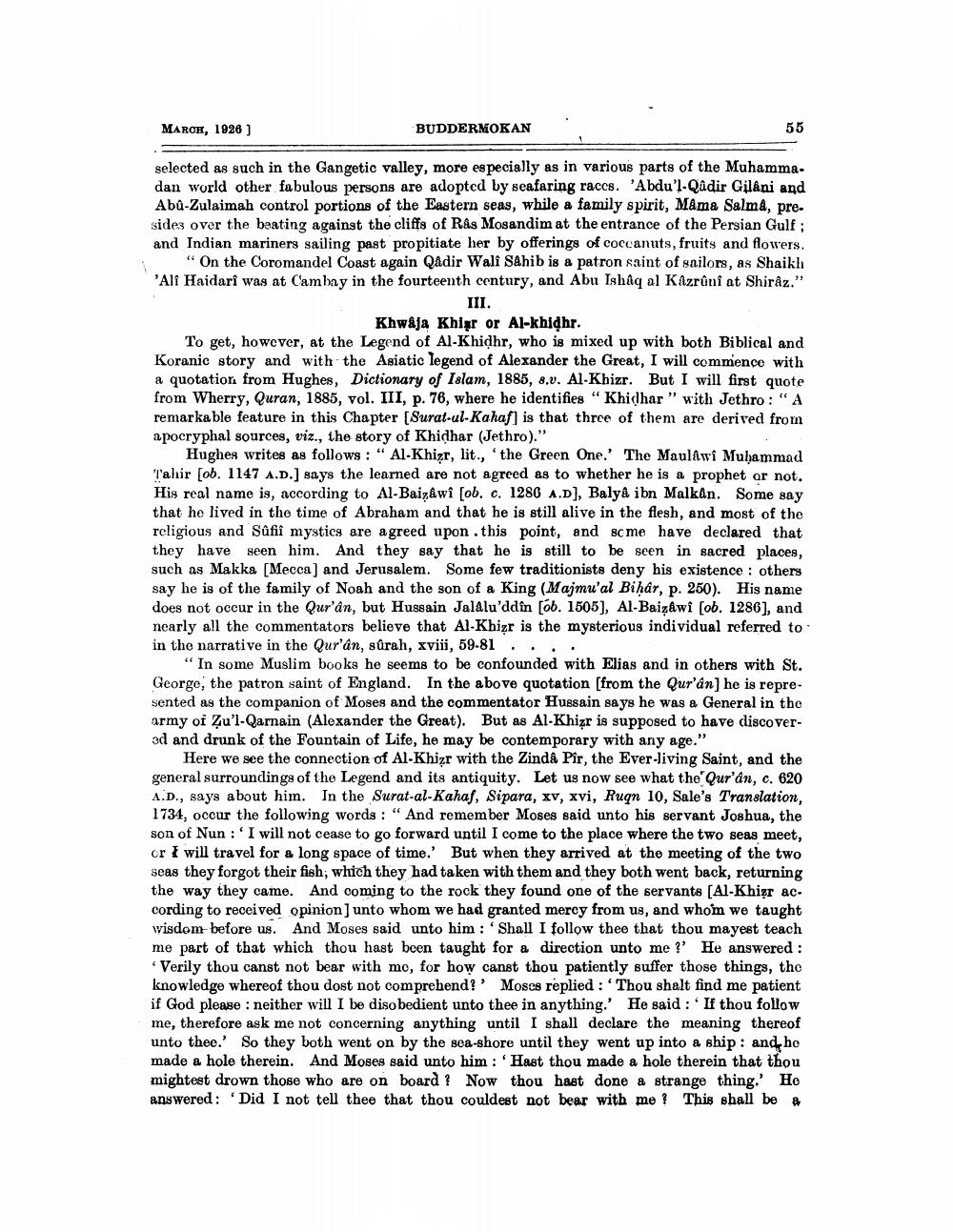________________
MAROH, 1926)
BUDDERMOKAN
55
selected as such in the Gangetic valley, more especially as in various parts of the Muhammadan world other fabulous persons are adopted by seafaring raccs. 'Abdu'l-Qâdir Gilani and Abû-Zulaimah control portions of the Eastern seas, while a family spirit, Mama Salma, pre. sides over the beating against the cliffs of Ras Mosandim at the entrance of the Persian Gulf ; and Indian mariners sailing past propitiate her by offerings of coccanuts, fruits and flowers.
"On the Coromandel Coast again Qadir Wali Sahib is a patron saint of sailors, as Shaikh 'Ali Haidari was at Cambay in the fourteenth century, and Abu Ishaq al Kazrůni at Shiraz."
III.
Khwaja Khiar or Al-khidhr. To get, however, at the Legend of Al-Khidhr, who is mixed up with both Biblical and Koranic story and with the Asiatic legend of Alexander the Great, I will commence with a quotation from Hughes, Dictionary of Islam, 1885, 8.v. Al-Khizr. But I will first quote from Wherry, Quran, 1885, vol. III, p. 76, where he identifies “Khidhar" with Jethro :"A remarkable feature in this Chapter [Surat-ul-Kahaf] is that three of them are derived from apocryphal sources, viz., the story of Khidhar (Jethro)."
Hughes writes as follows: " Al-Khiqr, lit., 'the Green One.' The Maulawi Muhammad Tahir [ob. 1147 A.D.) says the learned are not agreed as to whether he is a prophet or not. His real name is, according to Al-Baiz&wi (ob. c. 1286 A.D), Balya ibn Malkan. Some say that he lived in the time of Abraham and that he is still alive in the flesh, and most of the religious and Sûfî mystics are agreed upon .this point, and some have declared that they have seen him. And they say that he is still to be seen in sacred places, such as Makka (Mecca) and Jerusalem. Some few traditionists deny his existence : others say he is of the family of Noah and the son of a King (Majmu'al Bihar, p. 250). His name does not occur in the Qur'an, but Hussain Jalalu'ddîn (ob. 1505), Al-Baizawî [ob. 1286), and nearly all the commentators believe that Al-Khizr is the mysterious individual referred to in the narrative in the Qur'an, sürah, xviii, 59-81 ...
"In some Muslim books he seems to be confounded with Elias and in others with St. George, the patron saint of England. In the above quotation (from the Qur'an) he is represented as the companion of Moses and the commentator Hussain says he was a General in the army of Zu'l-Qarnain (Alexander the Great). But as Al-Khizr is supposed to have discoverod and drunk of the Fountain of Life, he may be contemporary with any age."
Here we see the connection of Al-Khizr with the Zinda Pîr, the Ever-living Saint, and the general surroundings of the Legend and its antiquity. Let us now see what the Qur'an, c. 620 A.D., says about him. In the Surat-al-Kahaf, Sipara, xv, xvi, Ruqn 10, Sale's Translation, 1734, occur the following words : “And remember Moses said unto his servant Joshua, the son of Nun: 'I will not cease to go forward until I come to the place where the two seas meet, cr I will travel for a long space of time.' But when they arrived at the meeting of the two seas they forgot their fish, which they had taken with them and they both went back, returning the way they came. And coming to the rock they found one of the servants [Al-Khirr ac. cording to received opinion) unto whom we had granted mercy from us, and whom we taught wisdom before us. And Moses said unto him : Shall I follow thee that thou mayest teach me part of that which thou hast been taught for a direction unto me?' He answered :
Verily thou canst not bear with mo, for how canst thou patiently suffer those things, the knowledge whereof thou dost not comprehend!' Moses replied: Thou shalt find me patient if God please : neither will I be disobedient unto thee in anything. He said : If thou follow me, therefore ask me not concerning anything until I shall declare the meaning thereof unto thee.' So they both went on by the sea-shore until they went up into a ship: and ho made a hole therein. And Moses said unto him: 'Hast thou made a hole therein that thou mightest drown those who are on board ? Now thou hast done a strange thing. He answered: 'Did I not tell thee that thou couldest not bear with me? This shall be




